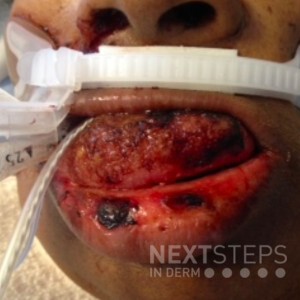
The correct answer is A. Lisinopril.
A number of drugs can cause angioedema without wheals. The most common are NSAIDs and ACE inhibitors. Aspirin intolerance may present with angioedema alone, or with urticaria or anaphylaxis; cross-reactions with other NSAIDs can occur. A causative link to ACE inhibitors may be overlooked because angioedema can present over a year after starting the medication. For practical purposes, ACE inhibitors should be discontinued in favor of other antihypertensive medications if angioedema occurs without wheals. ACE inhibitors are contraindicated in patients with HAE and acquired C1 inh deficiency.
2-Vancomycin is not the most common cause of angioedema out of the medications listed. 3-Ampicillin is not the most common cause of angioedema out of the medications listed. 4-Trimethoprim-sulfamethoxazole is not the most common cause of angioedema out of the medications listed. 5-Doxycycline is not the most common cause of angioedema out of the medications listed.
References:
RA Sabroe, A Kobza-Black: Angiotensin-converting enzyme (ACE) inhibitors and angio-oedema. Br J Dermatol. 136:153-158 1997 PMID 9068723
